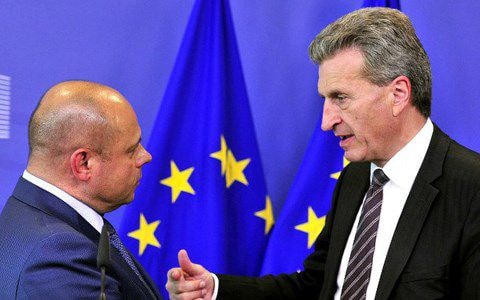Russia and the EU continuously "retaliate" against each other
The EU has agreed to extend economic sanctions against Russia over its annexation of Crimea in March last year.
Thus, despite goodwill from Russia, the tit-for-tat retaliation between the two sides since the outbreak of the crisis in Ukraine has yet to end.
The European Council (EC) said yesterday that 28 member states of the European Union, when meeting in Brussels, Belgium, continued to condemn the Russian Federation's annexation of Crimea and the Sevastopol region, and pledged to maintain full implementation of the policy of not recognizing the legitimacy of this event.
 |
| EC meeting in Brussels Belgium continues to condemn Russia's impending annexation of Crimea |
It is expected that the agreement agreed upon by EU ambassadors in Brussels (Belgium) will be officially approved at the meeting of EU foreign ministers in Luxembourg on June 22.
The EU's decision also includes sanctions agreed last June, including a ban on cruise ships operating in Crimean ports and restrictions on exports of telecommunications and transport equipment from the peninsula.
Meanwhile, on the Russian side, last night, speaking at the St Petersburg International Economic Forum, Russian President Vladimir Putin declared that Russia is open to the world and will cooperate with the West despite persistent tensions related to the crisis in Ukraine.
“Russia is open to the world. Our active cooperation with new growth centers in the world does not mean that we want to reduce our attention to dialogue with traditional Western partners,” he said.
At the same forum, President Putin blamed the West, especially the US, for the crisis in Ukraine. He also said that the West needs to put pressure on Kiev to help resolve the crisis.
In addition, the Russian leader affirmed that Moscow is ready to use its influence in eastern Ukraine to help the parties reach a compromise and ensure the peace agreements reached in February are fully implemented.
“Some countries always believe that Russia should use its influence in southeastern Ukraine, but they do not understand that it is impossible to solve the crisis through one-sided efforts. Influence must also be shown on the Ukrainian government, which we cannot do. This is the job of Western countries, the United States and the European Union,” he said.
The sanctions, which targeted Russia's energy, defense and financial sectors, were imposed by the European Union in July last year after Russia annexed the Crimean peninsula following a referendum in which the overwhelming majority of the population supported the annexation. As the conflict in Ukraine continued to escalate, the European Union expanded its economic sanctions against Russia, banning investment and imports from Crimea.
The Russian President has mentioned his goodwill in recent trips to the West, but he still maintains a tough stance on the situation in Ukraine. The lack of compromise between Russia and the West has caused economic losses for both sides./.
According to VOV.VN


